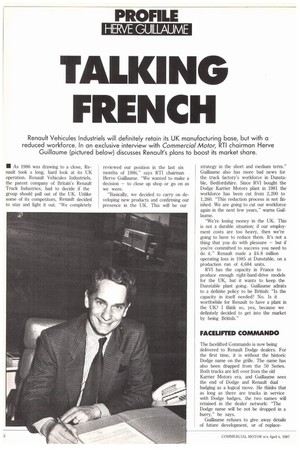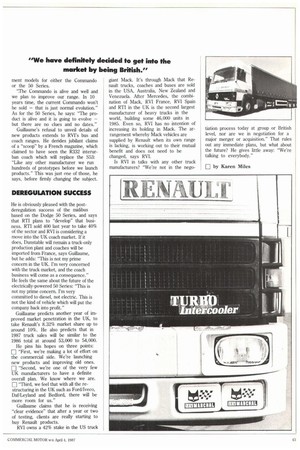TALKING F ENCH
Page 44

Page 45

If you've noticed an error in this article please click here to report it so we can fix it.
Renault Vehicules lndustriels will definitely retain its UK manufacturing base, but with a reduced workforce. In an exclusive interview with Commercial Motor, RTI chairman Nerve Guillaume (pictured below) discusses Renault's plans to boost its market share.
iii As 1986 was drawing to a close, Renault took a long, hard look at its UK operation. Renault Vehicules Industriels, the parent company of Britain's Renault Truck Industries, had to decide if the group should pull out of the UK. Unlike some of its competitors, Renault decided to stay and fight it out. "We completely reviewed our position in the last six months of 1986," says RTI chairman Herve Guillaume. "We wanted to make a decision — to close up shop or go on as we were.
"Basically, we decided to carry on developing new products and confirming our presence in the UK. This will be our strategy in the short and medium term." Guillaume also has more bad news for the truck factory's workforce in Dunstable, Bedfordshire. Since RVI bought the Dodge Icarrier Motors plant in 1981 the workforce has been cut from 2,200 to 1,260. "This reduction process is not finished. We are going to cut our workforce again in the next few years," warns Guillaume.
"We're losing money in the UK. This is not a durable situation; if our employment costs are too heavy, then we're going to have to reduce them. It's not a thing that you do with pleasure — but if you're committed to success you need to do it." Renault made a 24.8 million operating loss in 1985 at Dunstable, on a production run of 4,684 units.
RVI has the capacity in France to produce enough right-hand-drive models for the UK, but it wants to keep the Dunstable plant going. Guillaume admits to a definite policy to be British: "Is the capacity in itself needed? No. Is it worthwhile for Renault to have a plant in the UK? I think so, yes, because we definitely decided to get into the market by being British."
FACELIFTED COMMANDO
The facelifted Commando is now being delivered to Renault Dodge dealers. For the first time, it is without the historic Dodge name on the grille. The name has also been dropped from the 50 Series. Both trucks are left over from the old Karrier Motors era, and Guillaume sees the end of Dodge and Renault dual badgjng as a logical move. He thinks that as long as there are trucks in service with Dodge badges, the two names will retained in the dealer network: "The Dodge name will be not be dropped in a hurry," he says.
Guillaume refuses to give away details of future development, or of replace ment models for either the Commando or the 50 Series.
"The Commando is alive and well and we plan to improve our range. In 10 years time, the current Commando won't be sold — that is just normal evolution." As for the 50 Series, he says: "The product is alive and it is going to evolve — but there are no clues and no dates."
Guillaume's refusal to unveil details of new products extends to RVI's bus and coach ranges. He derides jubilant claims of a "scoop" by a French magazine, which claimed to have seen the R332 interurban coach which will replace the S53: "Like any other manufacturer we run hundreds of prototypes before we launch products." This was just one of those, he says, before firmly changing the subject.
DEREGULATION SUCCESS
He is obviously pleased with the postderegulation success of the midibus based on the Dodge 50 Series, and says that RTI plans to "develop" that business. RTI sold 400 last year to take 40% of the sector and RVI is considering a move into the UK coach market. If it does, Dunstable will remain a truck-only production plant and coaches will be imported from France, says Guillaume, but he adds: "This is not my prime concern in the UK. I'm very concerned with the truck market, and the coach business will come as a consequence." He feels the same about the future of the electrically-powered 50 Series: "This is not my prime concern. I'm very committed to diesel, not electric. This is not the kind of vehicle which will put the company back into profit."
Guillaume predicts another year of improved market penetration in the UK, to take Renault's 8.32% market share up to around 10%. He also predicts that in 1987 truck sales will be similar to the 1986 total at around 53,000 to 54,000.
He pins his hopes on three points: "First, we're making a lot of effort on the commercial side. We're launching new products and improving old ones. EI "Second, we're one of the very few UK manufacturers to have a definite overall plan. We know where we are. LI "Third, we feel that with all the restructuring in the UK such as Ford/Iveco, Daf/Leyland and Bedford, there will be more room for us."
Guillaume claims that he is receiving "clear evidence" that after a year or two of testing, clients are really starting to buy Renault products.
RVI owns a 42% stake in the US truck giant Mack. It's through Mack that Renault trucks, coaches and buses are sold in the USA, Australia, New Zealand and Venezuela. After Mercedes, the combination of Mack, RYE France, RVI Spain and RTI in the UK is the second largest manufacturer of heavy trucks in the world, building some 46,000 units in 1985. Even so, RVI has no intention of increasing its holding in Mack. The arrangement whereby Mack vehicles are supplied by Renault when its own range is lacking, is working out to their mutual benefit and does not need to be changed, says RVI.
Is RVI in talks with any other truck manufacturers? "We're not in the nego tiation process today at group or British level, nor are we in negotiation for a major merger or acquisition." That rules out any immediate plans, but what about the future? He gives little away: "We're talking to everybody."
by Karen Miles




















































































